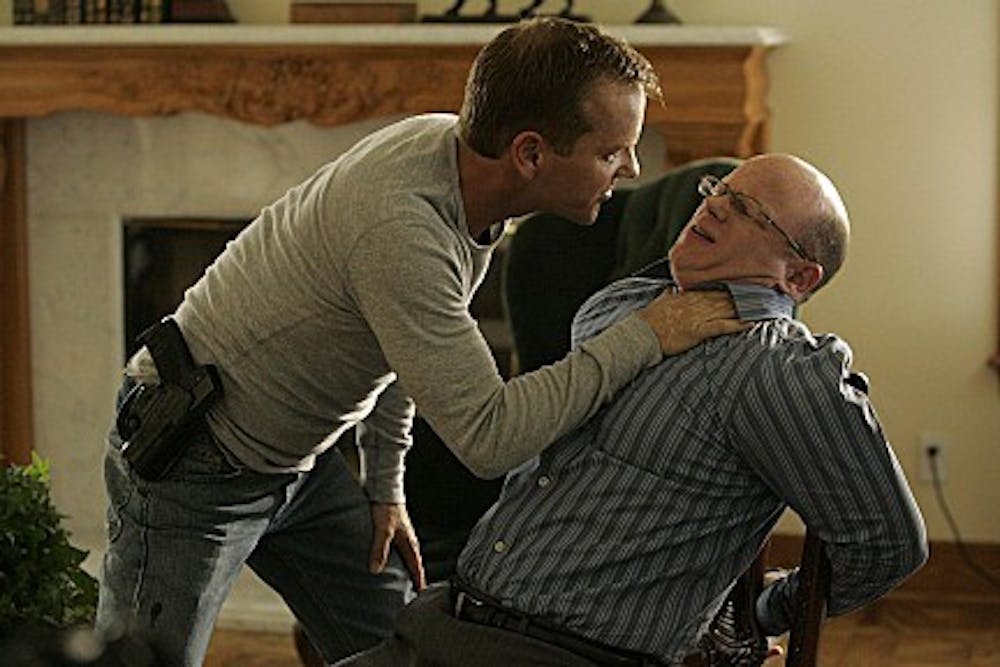He holds a counter productively-large gun, eyes in a wrinkled, taut squint with a mouth distracted by a cigarette, a toothpick or just the undeniable urge to contort into an ever-shrinking sneer. The criminals, those entitled, slimy scumbags with leering, sprinting eyes running suicides atop their sunglasses, stumble down alleyways opposite the man with the scrunched face. But he's no longer a man, he's the law, the living embodiment of the boiling revenge that sits on society's stove until someone's brave enough to put on the oven mitts of justice, grab hold of the scalding kettle and drain a culture's repressed vengeful and just desires with a single minded righteous fury that few can summon.
The vigilante, that time-honored, hard-broiled, overly-narrated icon of American iconography. Just think about how dominant the idea of not just a tough guy, but a tough guy who isn't bound by rules or societal norms, whose actions are determined by pure emotion and driven by instinct. The cowboy epitomizes the lone, lawless figure. The 20th century in particular has been inundated with vigilantes, or at least characters who live by the same code of conduct. Nearly every character Clint Eastwood has played, almost every superhero, a good number of John Wayne's roles and of course, the ever-present anti-hero of the past few decades, contains the same personification of lawlessness and inherent disapproval of authority, regardless of their role within or outside of the system. Even before then, the glamorization of Jesse James, Wild Bill Hickok and other lawless gunmen held their own.
I bring this topic forward because I recently saw "Taxi Driver" for the first time, and while the film is a powerful piece of work, the following it has received is even more interesting than the movie. There are plenty of people who like Taxi Driver, and many folks who have recommended the film to me have this amped-up, excited attitude toward it, a sentiment that is bizarre given the proceedings of the film. It's not a movie that brought me excitement, there was no adrenaline rush, only a lingering and compounding sense of dread.
The catchphrase from the film, the oft-repeated, "Are you talkin' to me" routine has been turned into a celebration of masculinity, because the reaction of many is that they want to be Travis Bickle, they want to be completely unrestrained, to be so lost that they've found a clear-cut idea free of the haze of societal morality. Bickle isn't necessarily someone to be admired, it's open to interpretation as to whether or not his actions, as fueled by delusion and madness as they were, were ultimately worthy of condemnation or praise. But more often than not, people decide that the ends justify the means, even if the means involve a severe detachment from reality.
Just think of the hooplah over "The Dark Knight" (and we're talking thematically, not the initial outpouring of interest due to Heath Ledger's tragedy). It wasn't because everyone was captivated by Batman, it was because his vigilante spirit was completely overshadowed by that of the Joker's. In the villain, audiences found someone who took the attitude of the likes of Dirty Harry, "Death Wish's" Paul Kersey and Bickle to its ultimate conclusion. The complete sovereignty of the individual over society, a complete removal from social constructs and the demotion of humanity to the status of animals. Vigilantes are driven by their individual senses of justice, this is what limits them from going completely off the wall, because fundamentally, their justice is dictated by the purest form of justice that their society tends to stray from. Push a vigilante to his breaking point, and that moralistic sense of justice will disappear.
If anything, the vigilante's admiration has made a comeback in recent years, with the ongoing resurgence of the superhero as a prominent archetype. Just look at the way in which the vigilante activity was handled in the "Watchmen" film compared to its literary counterpart. In the comic book, the actual violence is far from the focus of the narrative, it's handled as a revoltingly brutal activity that is always handled without any sense of glorification. The film, on the other hand, bathes itself in the gore, the degree of violence was featured heavily in the promotional activities and fight scenes were edited, emphasized and even created out of thin air. The viewer is left with the impulse to think, "Oh, this is so bada**," instead of the, "Ugh, do they have to?" in the book. The film treats vigilantism as awesome, while the book treats it with moral ambiguity. And it should come as no surprise that the comic was written by an Englishman, while the film was directed by an American.
It's interesting to see that, during the reemergence of the "I'm mad as hell and I'm not going to take it anymore" syndrome, especially in reaction to Obama (who is apprently a clone of some Egyptian dude now...) that Clint Eastwood's "final" film, "Gran Torino" features a conclusion that forgoes the typical vigilante bloodbath between the hero and criminal scum, but instead revolves around utilizing the civic spirit from which vigilantism stems to use law enforcement against scum. If Dirty Harry renounces violence and its glorification, what does that say about the legitimacy of those who look at Taxi Driver and think, "Awesome"


